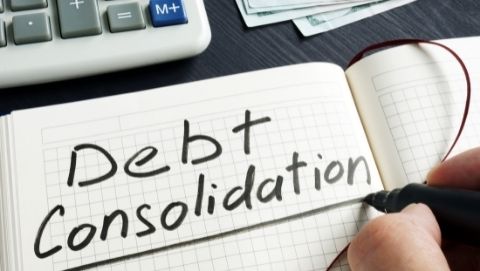Is Debt Consolidation a Good Idea?
By: Jerevie Canlas, Empowering Financial Wellness Program Coordinator
July 13, 2021

This question does not have a straightforward answer. Every debt situation is different, and your debt management strategy will depend on your financial goals. If you have more than one debt, debt consolidation is an option that allows you to take your debts and lump them together into a single payment with a single interest rate. It comes with some advantages such as lower interest rate, lower monthly payments, and the convenience of not having to manage multiple debt payments. However, debt consolidation also has its disadvantages such as associated fees and costs, and even paying more in interest if your restructured loan lengthens the payoff timeline.
When exactly is debt consolidation a good idea? Here are some scenarios where debt consolidation could make sense:
- You have medical bills to consolidate and need some time to pay them off.
- You have too many bills coming in and you want to consolidate down to one.
- You have good or excellent credit, so you can qualify for a debt consolidation loan with the lowest interest rate and best terms.
- You have a plan in place to get out of debt and stay out.
If you think debt consolidation makes sense for your situation, consider the following before consolidating your debts:
- Can you qualify for a 0% interest, balance-transfer credit card? This debt consolidation option allows you to transfer all your debts into one card and works best if you are able to pay the balance in full within the promotional period. The caveat is that if you forfeit your promotional interest rate, you will lose that rate and end up paying the regular APR or the penalty rate. Also, bear in mind that there might be fees associated with the balance transfer so make sure you read the terms and conditions carefully before signing up.
- Can you get a fixed-rate debt consolidation loan with favorable terms? When you take out a debt consolidation loan, you use the money from that loan to pay off your debts and then you pay back the new loan in installments over a set period of time. Keep in mind that doing this does not make your debts disappear - you just replace all your debts with a single loan for which you are still responsible to pay back in full with interest. The kicker here is your interest rate. Currently, according to www.bankrate.com, the average APR for 24-month personal loans is about 9% - which is a lot lower than the average interest rate consumers are paying on their credit cards. However, the actual rate you receive depends on several factors, and you typically need a good credit score and a low debt-to-income ratio to qualify for the best rates. You also have to remember that debt consolidation loans usually have fees associated with them called “origination fees”, which are typically 1%-8% of the loan amount.
- Are you putting a stop on borrowing? Debt consolidation works best for people who are ready to make a lifestyle change so they can avoid ending up in the same situation over and over again. There can be a false sense of accomplishment by transferring your debt to a new creditor -- and, in the process, you’re down to just one payment. The danger for some people is that you’re probably freeing up lines of credit from all of those debts that got transferred to one “debt” which can create a temptation to incur more debt. Debt consolidation is combining your debts, not erasing them. As with any debt repayment plan, the commitment to stop using debt is key.
- Last, but more importantly, look at your overall debt and look at its overall cost to you. The longer you are in debt, the more money is going to somebody else’s pocket instead of yours. Oftentimes, if you take the time to take a real good look at your finances, you’ll realize that you can get out of debt faster without paying extra money towards interest or a third party who offers to manage your debt for you. In fact, the PowerPay debt elimination tool can help you do this as it does the math for you.
The PowerPay program is for anyone who has more than one debt and is interested in finding a way to pay off debt quicker and save money. When you use PowerPay, you will get payoff schedule options and a calendar that shows you exactly how much to pay towards each debt every month, and you choose which payoff option works best for your situation. You can use it anytime, either on the free website or on the iOs app. Using mathematical calculations, following the PowerPay principles can get you from underneath your debt more quickly, while also saving you money in interest charges. As you gather all of your debt information and stop adding to your debts, your goal is to keep the total debt amount being paid constant every month until all debts are paid off and you do this by making PowerPayments - rolling over the debt amount your were previously paying towards another debt anyway on to the next target debt. With discipline and committing to not add on any more debt, PowerPay can help you eliminate debt without paying a third party, or restructuring your loans.

